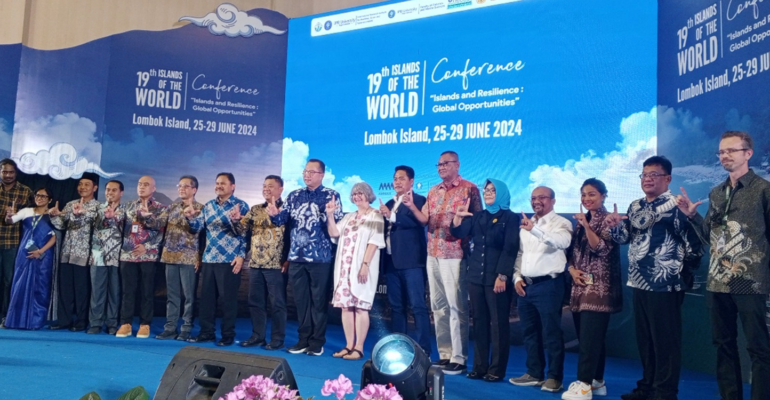IPB University Holds Indonesia’s First International Conference on the Challenges and Opportunities of the World’s Islands

The world’s small islands face enormous pressure from land-based planning, a lack of understanding of island culture, and natural limitations. Islands are not just land in the middle of the sea, but social spaces resulting from human and ecological adaptations. Climate change is adding pressure to island ecosystems and economies, threatening resources and forcing people to migrate as the environment no longer supports them.
In the midst of these growing global challenges, academics, practitioners and decision-makers for island management in the world gathered on the island of Lombok on 25/6, in the “19th World Islands Conference,” which was held for the first time in Indonesia with the theme “Islands and Resilience: Global Opportunities.”
The conference was organized collaboratively between the Center for Coastal and Marine Resources Studies (PKSPL) IPB University and the International Research Institute for Maritime, Marine and Fisheries (LRI i-MAR) IPB University with Mataram University, the Archipelagic and Islands States Forum (AIS), and the International Small Islands Studies Association (ISISA) with full support from various parties.
Prof Yonvitner as Chairman of PKSPL IPB University said that the conference was attended by 28 countries to discuss climate change, blue economy, small island governance, and island and archipelago culture.
“In addition to discussions on the results of studies on islands, this conference will invite participants to also experience the life and traditions of small island communities on Lombok Island through field excursions,” he said.
Rector of IPB University, Prof Arif Satria explained that the first world islands conference in Indonesia signifies that Indonesia and IPB University will take an important role in the world for the development of studies on islands and contribute to the achievement of Sustainable Development Goals (SDGs) in 2030.
“IPB University also wants stronger cooperation with various institutions in the world to answer the challenges of island development. Climate change issues such as sea level rise, extreme waves, hurricanes need answers, so this discussion is expected to produce new answers and commitments to solve the problem,” he said.
Bambang Hari Kusumo as the Rector of Mataram University also expressed his enthusiasm for this conference. “We hope that the discussions at this conference will produce important fruits to build resilient islands, rich in healthy ecosystems and prosperous communities,” he said.
Laurie Brinklow, president of ISISA, noted that ISISA is the first organization to bring together academics, practitioners and governments from island nations to discuss the geography, ecology, culture, politics and management models of islands. ISISA invites many parties to see islands as unique objects of study that are united by the ocean.
Meanwhile, Victor Gustaaf Manoppo, Director General of Marine and Spatial Management represented the Indonesian Minister of Maritime Affairs and Fisheries in emphasizing that the Indonesian government considers that Indonesian waters are both valuable and vulnerable from human activities, climate change and pollution. “Blue economy is a formula to answer the challenges with the orientation of healthy ocean, wealthy ocean and ocean prosperity,” said Victor.
On this occasion, Prof Luky Adrianto as the Cahirman of i-Mar PB University said that Indonesia has DNA as an archipelagic country that requires transdisciplinary studies on governance and sustainable use from the aspects of the land system, water system to a wider circle, namely as an archipelagic system thinking. (yp/Lp) (IAAS/NYS).



